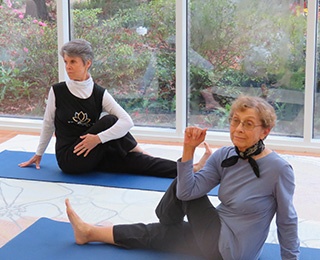Published: November 15, 2016
 Regardless of your beliefs and traditions, you’re likely to run into a Santa Claus or two during the holidays. You’re also likely to encounter two other visitors during the upcoming month that go by the same initials – Stress and Calories.
Regardless of your beliefs and traditions, you’re likely to run into a Santa Claus or two during the holidays. You’re also likely to encounter two other visitors during the upcoming month that go by the same initials – Stress and Calories.
No surprise, really.
Our calendar is crowded with family, friend and coworker gatherings – sometimes enjoyable, other times arduous. Putting up decorations and shopping for gifts is often fun, but taxing too. Cookies and cakes, heavy meals and libations fill our tables, and our stomachs. Our sleep and exercise routines are disrupted, and body and mind grow weary.
As the New Year nears, we resolve to lighten up – physically and mentally – and vow not to make the same mistakes when the holidays roll around next year.
How about keeping that vow right now?
Don’t Take a Holiday from Exercise
Exercise is more important than ever when life is stressful. Make sure to set aside time in your busy holiday calendar for physical activity.
Here’s advice from experts on how to stay fit during the holidays.
- Be flexible, says Rich Ray, chairman of the Kinesiology Department at Hope College in Holland, Mich. “Instead of simply blowing off your 5 p.m. trip to the gym in favor of an office party at the same time, wake up an hour early and walk or jog before work. Or fit a brisk walk into your lunch hour.”
- Combine exercise with family commitments, Ray adds. Plan an outing that involves physical activity, such as skating, hiking, even walking around a zoo or holiday-decorated park.
- Speaking of walking, "always have a pair of running or walking shoes with you, along with a set of light, hand-held weights, and a clean pair of socks. If all else fails, you have the minimum equipment necessary to get in a walk," says health and lifestyle coach Jackie Keller.
- Create a home workout routine for those times you can't make it to the gym or fit in a run or swim, says New York-based exercise physiologist and personal trainer Louis Coraggio. Crunches, push-ups, yoga, Pilates and many other exercises can be done without any gym equipment, or purchase hand weights, resistance straps, DVD workouts and other small items to enhance your workout.
- Book a winter vacation to a warm climate, adds Coraggio. “This will motivate you to keep exercise a priority. When you're tempted to slack off, envision yourself looking good on the beach,” he says.
- Stay on track in cold weather with activities as ice-skating and cross-country skiing, but be sure to wear appropriate clothes, such as thermal underwear that wicks away sweat, says Kevin Gianni, author of The Busy Person's Fitness Solution.
- Ditto for traveling, whether by car or plane. “If you're driving, take your rest stops at parks or near a trailhead, and take a brief walk before hitting the road again. Wear your most comfortable shoes (ones that are also easy to take off for security), and get your steps in at the airport. Walk instead of taking the shuttle or a moving sidewalk between terminals,” says Pamela Hernandez, an ACSM Certified Personal Trainer and ACE Health Coach.
Keep Stress and Calories under Control
Along with maintaining an exercise program, don’t let extra stress and calories build up.
Schedule time for a massage or walk in the woods, a quiet night at home, alone or with your spouse – whatever is your personal stress buster.
The Cleveland Clinic suggests putting together a “holiday stress prevention list.”
For example, when it comes to holiday shopping, stick to a budget and ask people on your list for suggestions. If you are hosting a large gathering, ask others to bring a dish.
Keeping calories off also takes some planning too. Don’t pass up your favorite holiday sweet, just indulge in moderation.
Here are other suggestions from the Centers for Disease Control and Prevention:
1. Drink water. Choose water instead of sugar-sweetened beverages. Substituting water for one 20-ounce sugar-sweetened soda will save you around 200 or more calories, depending on the drink you choose. Give your water a little pizzazz by adding a wedge of lime or lemon. This may improve the taste, and you just might drink more water than you usually do.
2. Eat breakfast every day. When you don't eat breakfast, you are likely to make up for the calories you saved by eating more later on in the day. Many people who maintain long-term weight loss eat breakfast daily.
3. Fruits and veggies: keep it simple! Most fruits and veggies are low-calorie and will fill you up, but the way you prepare them can change that. Breading and frying, and using high-fat creams or butter with vegetables and fruit will add extra calories. Try steaming vegetables and using spices and low-fat sauces for flavor. And enjoy the natural sweetness of raw fruit.
 Molly Kavanaugh frequently wrote about Kendal at Oberlin for the Cleveland Plain Dealer, where she was a reporter for 16 years.
Molly Kavanaugh frequently wrote about Kendal at Oberlin for the Cleveland Plain Dealer, where she was a reporter for 16 years.





